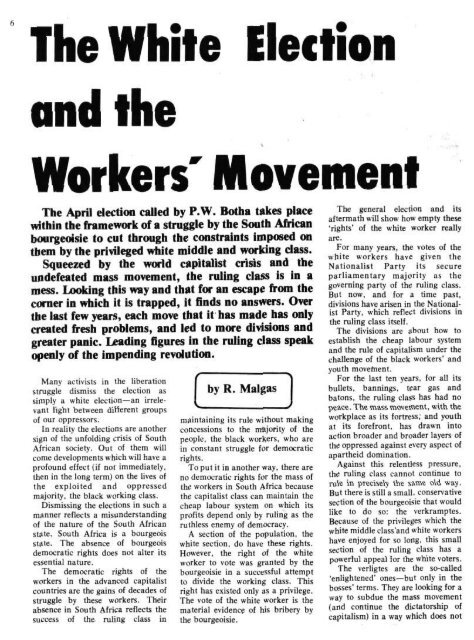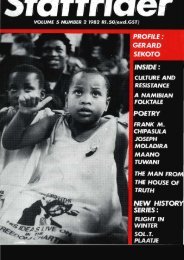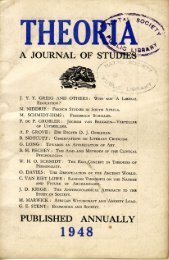Inqaba ya basebenzi Number 2 April 1981 - DISA
Inqaba ya basebenzi Number 2 April 1981 - DISA
Inqaba ya basebenzi Number 2 April 1981 - DISA
Create successful ePaper yourself
Turn your PDF publications into a flip-book with our unique Google optimized e-Paper software.
The White Election<br />
and the<br />
Workers' Movement<br />
The <strong>April</strong> election called by P.W. Botha takes place<br />
within the framework of a struggle by the South African<br />
bourgeoisie to cut through the constraints imposed on<br />
them by the privileged white middle and working class.<br />
Squeezed by the worid capitalist crisis and the<br />
undefeated mass movement, the ruling class is in a<br />
mess. Looking this way and that for an escape from the<br />
corner in which it is trapped, it finds no answers. Over<br />
the last few years, each move that it has made has only<br />
created fresh problems, and led to more divisions and<br />
greater panic. Leading figures in the ruling class speak<br />
openly of the impending revolution.<br />
Many activists in the liberation<br />
struggle dismiss the election as<br />
simply a white election—an irrelevant<br />
fight between different groups<br />
of our oppressors.<br />
In reality the elections are another<br />
sign of the unfolding crisis of South<br />
African society. Out of them will<br />
come developments which will have a<br />
profound effect (if not immediately,<br />
then in the long term) on the lives of<br />
the exploited and oppressed<br />
majority, the black working class.<br />
Dismissing the elections in such a<br />
manner reflects a misunderstanding<br />
of the nature of the South African<br />
state. South Africa is a bourgeois<br />
state. The absence of bourgeois<br />
democratic rights does not alter its<br />
essential nature.<br />
The democratic rights of the<br />
workers in the advanced capitalist<br />
countries are the gains of decades of<br />
struggle by these workers. Their<br />
absence in South Africa reflects the<br />
success of the ruling class in<br />
by R. Malgas<br />
maintaining its rule without making<br />
concessions to the majority of the<br />
people, the black workers, who are<br />
in constant struggle for democratic<br />
rights.<br />
To put it in another way, there are<br />
no democratic rights for the mass of<br />
the workers in South Africa because<br />
the capitalist class can maintain the<br />
cheap labour system on which its<br />
profits depend only by ruling as the<br />
ruthless enemy of democracy.<br />
A section of the population, the<br />
white section, do have these rights.<br />
However, the right of the white<br />
worker to vote was granted by the<br />
bourgeoisie in a successful attempt<br />
to divide the working class. This<br />
right has existed only as a privilege.<br />
The vote of the white worker is the<br />
material evidence of his bribery by<br />
the bourgeoisie.<br />
The general election and its<br />
aftermath will show how empty these<br />
'rights' of the white worker really<br />
are.<br />
For many years, the votes of the<br />
white workers have given the<br />
Nationalist Party its secure<br />
parliamentary majority as the<br />
governing party of the ruling class.<br />
But now, and for a time past.<br />
divisions have arisen in the Nationalist<br />
Party, which reflect divisions in<br />
the ruling class itself.<br />
The divisions are about how to<br />
establish the cheap labour system<br />
and the rule of capitalism under the<br />
challenge of the black workers' and<br />
youth movement.<br />
For the last ten years, for all its<br />
bullets, bannings, tear gas and<br />
batons, the ruling class has had no<br />
peace. The mass movement, with the<br />
workplace as its fortress; and youth<br />
at its forefront, has drawn into<br />
action broader and broader layers of<br />
the oppressed against every aspect of<br />
apartheid domination.<br />
Against this relentless pressure,<br />
the ruling class cannot continue to<br />
rule in precisely the same old way.<br />
But there is still a small, conservative<br />
section of the bourgeoisie that would<br />
like to do so: the verkramptes.<br />
Because of the privileges which the<br />
white middle class'and white workers<br />
have enjoyed for so long, this small<br />
section of the ruling class has a<br />
powerful appeal for the white voters.<br />
The verligtes are the so-called<br />
'enlightened* ones—but only in the<br />
bosses' terms. They are looking for a<br />
way to subdue the mass movement<br />
(and continue the dictatorship of<br />
capitalism) in a way which does not
















